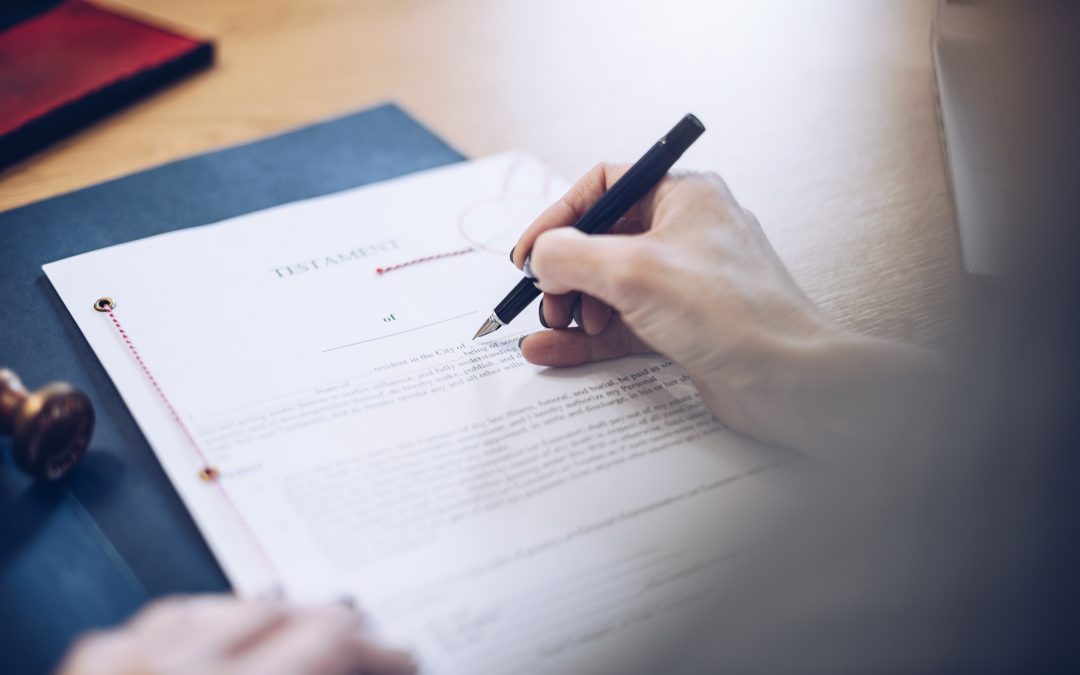If you have gone to the trouble of drafting a will to ensure that your assets are distributed according to your wishes after you die, then it is important to ensure that the will is legally valid. A simple mistake can undo your wishes, as happened in this example.
David decided to draft his will without legal assistance, opting for a DIY (do-it-yourself) pack. He outlined how he wanted his assets to be distributed among his children and a charity he supported. He asked two of his neighbours to act as witnesses, but he signed the will in his living room before taking the will to each neighbour’s house separately for them to sign as a witness, which they did. Neither witness was present when David signed the will, and this came to light during probate and the will was declared invalid because it did not meet the legal witnessing requirements. It was therefore disregarded entirely, and his estate was distributed according to the rules of intestacy. This meant that the charity received nothing and David’s assets were divided among his closest relatives, which was not his intention.
‘The people and process involved in signing and witnessing a will are fundamental to ensuring it is a valid will,’ says Jessica Wycliffe-Jones an Associate Solicitor in the wills and probate team here at Wollens. ‘We often see problems arising when people use a cheap template or attempt to draft their will without professional legal advice.’
In this article, Jessica explores the legal requirements for signing a will, the role and responsibilities of witnesses, proper witnessing procedures, and the consequences of failing to adhere to these requirements.
How to sign your will
Under English law, the requirements for signing a will are governed by the Wills Act 1837.
For your will to be legally valid it must be in writing and signed by you or, less commonly, by someone else in your presence and at your direction. For example, if you are unable to sign your will due to a physical limitation, such as a hand disability or injury, you can either direct someone else to sign on your behalf or sign using a mark like an ‘X’ or another simple mark.
A will requires a handwritten signature from you in the presence of two witnesses. Signing a will electronically, whether through an e-signature or any digital means, does not constitute a valid execution of this will.
You must have the legal capacity to create a will, meaning you must be at least 18 years old and of sound mind.
Is signing a codicil different?
A codicil is a legal document that allows you to make minor changes or additions to an existing will without having to create a new one. Like a will, a codicil must be signed and witnessed in accordance with the Wills Act to be valid.
How many witnesses are required?
You must sign or acknowledge your signature in the presence of at least two witnesses who are present at the same time. Each witness must then attest and sign the will in your presence (but not necessarily in the presence of the other witness).
Witnesses must therefore be present at the same time as you to observe you signing your will. After you sign, each witness must then sign the will in your presence. Their name, address and occupation should also be stated on the will.
Strictly speaking, witnesses do not need to have read the will or know what it contains.
Who can witness my will?
Witnesses should be independent individuals, meaning they should not be beneficiaries of your will or related to anyone who is a beneficiary.
If a beneficiary or someone closely related to a beneficiary serves as a witness, this could result in the beneficiary losing their entitlement under the will, although the will itself may remain valid.
For example, after taking no formal legal advice, Elizabeth gave most of her estate to her niece in her will. She also asked her niece to serve as one of the witnesses to the will, having no idea this was not permitted. When a dispute arose, the court ruled that while the will was valid, the niece was disqualified from receiving her inheritance because she was a witness, and the estate was distributed among the other beneficiaries.
Role and responsibilities of witnesses
Witnesses play an essential part in the execution of a valid will, to ensure compliance with the requirements of the Wills Act so that the will is valid.
Their role is to verify that:
- you are the person who is signing the will;
- that the signature is not forged; and
- you have not been coerced into signing it.
Normally this concludes the role of a witness to a will, but evidence may be required from witnesses to a will after death as part of an estate dispute. For example, if someone has made a claim that a will is invalid due to ‘lack of due execution’, where the legal requirements for making a valid will are alleged not to have been followed.
Alternatively, someone may claim that you did not have the mental capacity to sign a will or that you were subject to undue influence. In either case, witnesses may be required to provide evidence in the form of an affidavit or witness statement setting out what they may have seen or heard during the will signing process.
Even in less contentious estates, the Probate Registry often raises queries as to the circumstances of the signing of wills, and witnesses are asked to sign an ‘affidavit of execution of a will’ to confirm the will was signed and witnessed according to law.
What is the proper procedure for witnessing a will?
It is important that the witnesses are physically present with you at the time of signing, as remote witnessing (via video conferencing, for example) generally does not meet the legal requirements.
During the Covid-19 pandemic, the UK Government temporarily relaxed the rules to allow remote witnessing of wills via video conferencing between 31 January 2020 and 31 January 2022. This measure was introduced under the Wills Act 1837 (Electronic Communications) (Amendment) (Coronavirus) Order 2020 and specified that the witnesses must still see the testator sign the will (or acknowledge their signature) in real-time, and the will must be signed by the witnesses as soon as possible thereafter.
Although wills executed via video conferencing during the specified period are legally valid, resigning the will now in the physical presence of witnesses would be considered good practice and ensures that there can be no doubts about the will’s validity in the future.
Consequences of improper signing and witnessing of a will
If a will is not signed and witnessed in compliance with the requirements of the Wills Act, it may be declared invalid. This can result in your estate being distributed according to the rules of intestacy or under the terms of a previous will, which is unlikely to reflect your wishes. Intestacy laws generally prioritise close family members, potentially excluding partners, friends, charities, or other entities that you may have intended to benefit.
Improperly executed wills can also lead to disputes among potential beneficiaries, resulting in costly and prolonged legal battles. These disputes can deplete the estate’s assets and create disharmony among family members. In some cases, the court may deem certain parts of the will invalid, while upholding others, leading to partial intestacy or unintended distributions.

How we can help
We understand the complexities and nuances of will drafting and execution. Our experienced team is here to guide you through every step of the process, ensuring that your will is legally sound and reflects your true intentions. Whether you are creating a new will, updating an existing one, or making amendments through a codicil, we offer bespoke advice tailored to your unique circumstances.
We take the time to understand your wishes and ensure that your will is executed in strict compliance with the law, reducing the risk of disputes and ensuring that your estate is distributed exactly as you wish.
For further information contact Jessica Wycliffe-Jones
- Associate Solicitor
- [email protected]
- 01803 396634



